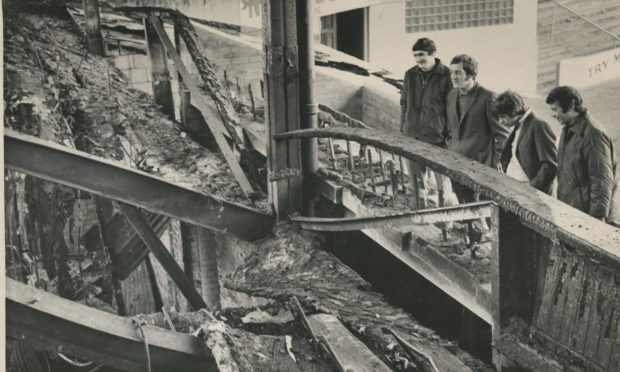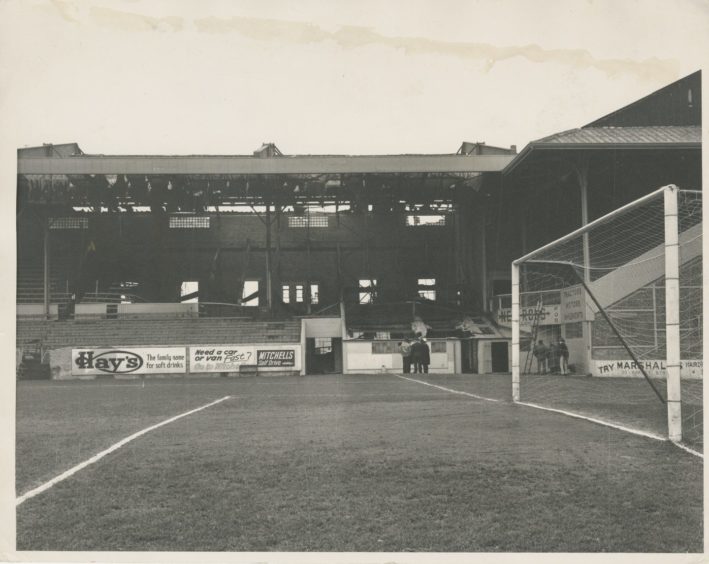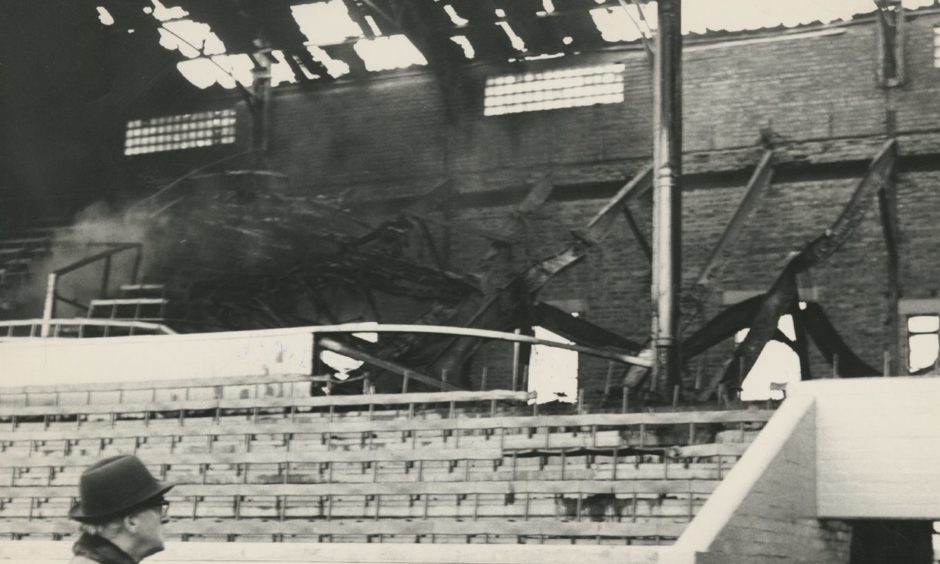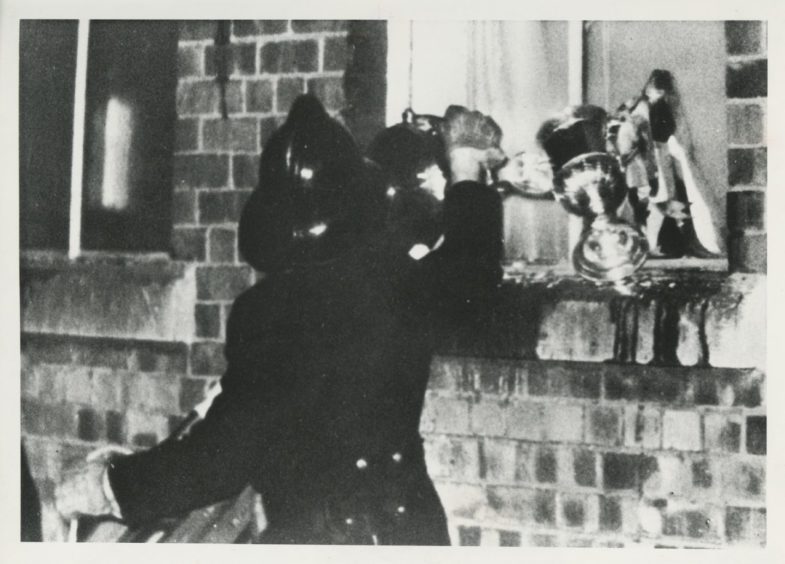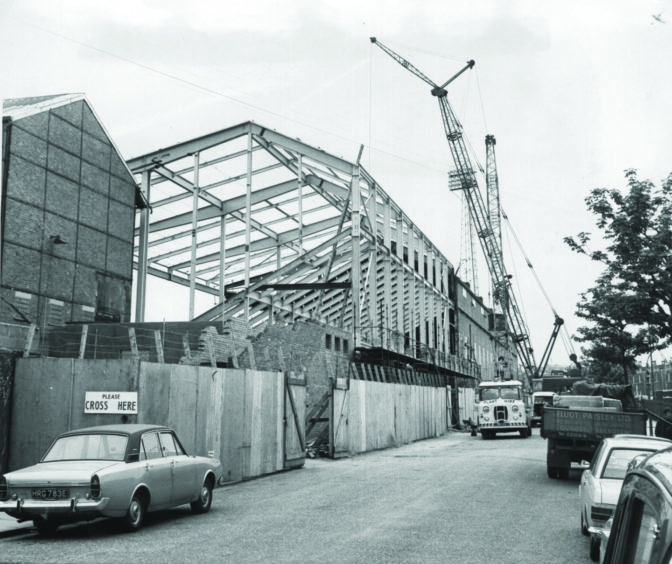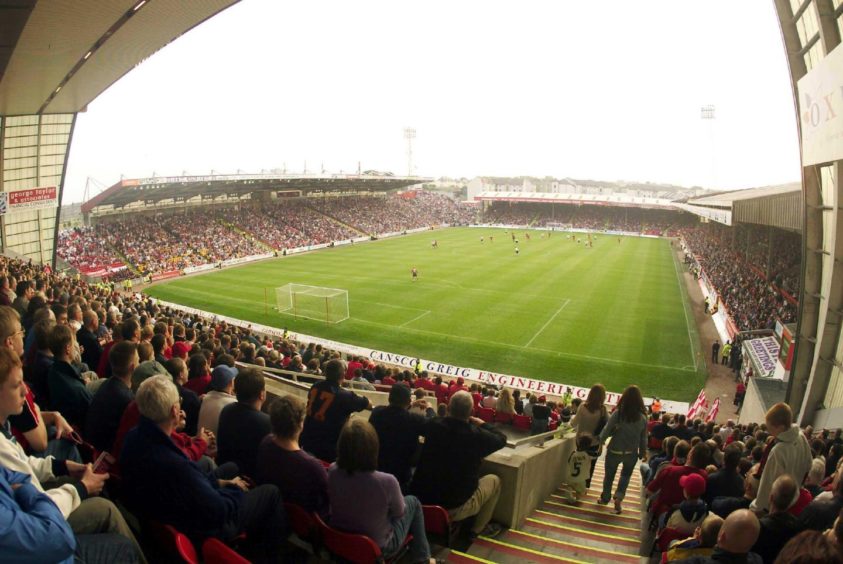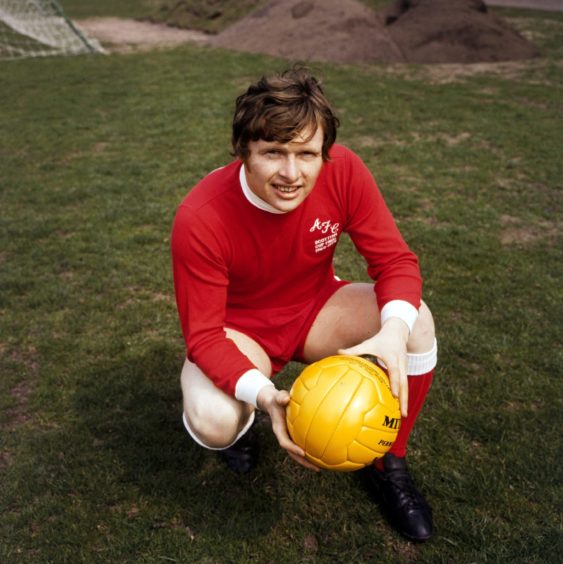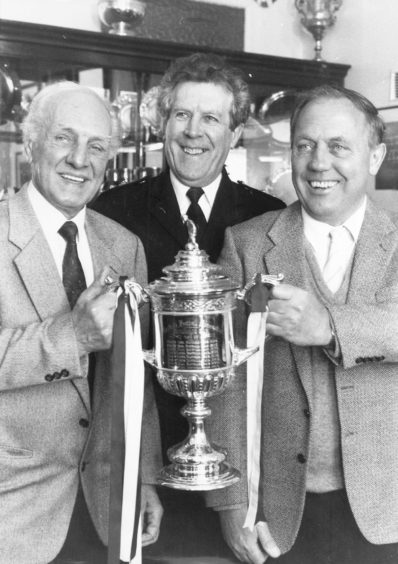Aberdeen FC were enjoying the bright lights at the start of 1971.
They had secured the Scottish Cup in the previous season and manager Eddie Turnbull was working his rough-hewn magic on the Dons.
In January, they moved to the summit of the championship table when the prolific Joe Harper beat Celtic goalkeeper John Fallon with a powerful header at Parkhead
And even the club’s more cautious aficionados began to dream they could bring an end to the long period of dominance for Jock Stein’s men in the title race.
The club’s dreams quickly turned to ashes
Yet, nobody was prepared for what happened on the night of February 5 and 6. As Turnbull said later: “All our dreams turned to ashes”.
And he was speaking quite literally after Pittodrie stadium was devastated by a ferocious fire, which required a massive response from the city’s fire and other emergency services 50 years ago.
Turnbull had no idea about the drama occurring elsewhere when he received a phone call in the middle of the night.
But he knew straight away that something was badly wrong when club secretary Bert Whyte told him: “Boss, the place is on fire.”
Turnbull, one of life’s tough-as-teak characters, a man who had witnessed some horrible sights during the Second World War whilst with the Royal Navy (and being posthumously awarded the Arctic Star in 2015) was not easily fazed.
Indeed, his initial response to hearing about the blaze was remarkable.
He went back to sleep.
As he explained: “It seemed to me I was dreaming the whole experience and I have since spoken to other people who have had the same reaction to bad news.
“But then, something inside my sleep-filled mind must have registered the importance of what I had been told.
“I sprang to life, was awake and fully conscious in an instant, then I dressed hurriedly, jumped in the car and drove to the stadium.
“It was unforgettable.
“From a fair distance away, I could see the glow in the dark; the place was well and truly alight.
“The blaze had started deep in the main stand and had spread quickly through the largely wooden structure.
“My heart was in my mouth.
“The whole thing was an inferno and there was all this activity by the firefighters to deal with a pretty desperate situation.
“As usual, they were terrific, they were courageous and they were totally professional. But they had a lot of hard work ahead of them.”
Rescuing the Scottish Cup from the flames
Within minutes of the conflagration breaking out in the Main Stand and creating a different and unwanted version of the Northern Lights in the sky, fire appliances from King Street and Anderson Drive were at the scene and dealing with a major incident.
The fire master, John Donnachie immediately recognised the severity of the situation and he and his colleagues responded, even as Mr Whyte arrived at Pittodrie and relayed the message that the Scottish Cup – a prized trophy which was already 98 years old – was in the club boardroom
It helped that Mr Donnachie was not only a seasoned firefighter, but a devoted Dons supporter, who was cognisant with the lay-out of the stadium and he rapidly devised a way of retrieving the Cup, even as thick smoke was billowing from the boardroom.
He said later: “We had to break the windows on Pittodrie Street, so I could put two men into the building.
“They felt their way through the smoke to the glass case and handed out all the trophies, with the Scottish Cup first. They were safe.”
However, the more time that passed and as dawn broke on the morning of Saturday February 6, the significant scale of the damage became all too evident.
And it brought negative consequences for Aberdeen both on and off the pitch in the months ahead.
Manager faced his worst dilemma
By the time that Turnbull reached the ground where he had enjoyed so much success, it was obvious that the fire had made a major impact on parts of the structure.
Inside Pittodrie, a plethora of old artefacts, memorabilia, historical remnants and other items had vanished for ever amid the flames.
And the manager could scarcely believe how rapidly a smouldering match or a carelessly-discarded cigarette butt had sparked such havoc.
He recalled: “There was no loss of life which was the main thing, but the dressing rooms were destroyed as well as many seats in the stand.
“In the morning light, it looked as though a stick of bombs had hit the place. Apart from the Cup, only two large metal trunks full of the players’ gear were saved.
“It was a Saturday, so these had been packed and made ready in advance for the match later that day against Dunfermline down in Fife.
“The players were already staying in a hotel and learned the news by telephone. But there was a bigger decision for me to take.”
To play or not to play?
In the early hours of the morning, Turnbull went through the whole gamut of emotions and admitted it took a heavy toll on him.
He had tough choices to make, even as the firefighters dampened down the area, and the extent of the damage became clear.
The manager said in his autobiography: “I faced a real dilemma, because I was pretty certain that the Scottish League would allow us to postpone the match.
“But we were going so well that I feared any interruption would halt our title charge. Sure enough, we were offered the chance of a postponement by the authorities.
“Yet I was worried about how the players would react and how they would feel about the news that their place of work – which had become a second home to some of them – had burned down.
“At first, I chose to cancel the game. But, as the morning wore on, I changed my mind and I decided that we should go ahead and play.
“It is a decision that haunted me and I think it cost us the title.”
Aberdeen stumbled and their title hopes went to blazes
The Dons’ minds seemed to be on other things when they met Dunfermline and they slipped to a 1-0 defeat, confounded by the goalkeeping exploits of Ernie McGarr – who had only left Aberdeen a few weeks earlier after being frustrated on the sidelines.
It wasn’t a dreadful outcome, and particularly since Celtic lost to St Johnstone, which meant that Turnbull’s team was still at the top of the table.
But he could see the effects of the mess around the club in the weeks ahead.
He said: “We had to change our training arrangements [to Linksfield Stadium] which was unsettling and Pittodrie was not the place it used to be. We could only draw with Rangers and St Mirren at home, where the wind whistled through the burnt-out stand.
“To be fair, the lads fought hard and kept grinding out results and we were still in pole position as the spring arrived. It all came down to our home match against Celtic on April 17 and I turned to Winston Churchill for inspiration with the message: ‘After nine months of blood, sweat and tears, the crunch comes today for the Dons’.
“But it was every bit as tough as we thought it would be. Harry Hood scored from a Jimmy Johnstone corner, but Alec Willoughby equalised and we created plenty of chances and were the better team, but it ended 1-1 and you could see from the reaction of our players at the finish that they realised our chance had gone.
“Looking back at the end of the season, I thought the fire and the loss against Dunfermline was the turning point for us. Yes, I know that a season does not revolve around a single match or incident, but that devastating fire hurt us so much.
“I will always ask myself: ‘What if I had postponed the Dunfermline fixture?”
Joe Harper recalls the devastating events of 1971
Joe Harper was among those who felt discombobulated by the fire and especially as he and his team-mates prepared for the crunch match with Celtic.
Aberdeen’s record goal-scorer said: “There was no doubt that the damage caused to the ground had an effect on the team.
“Everything was on hold, with no facilities, training was impossible and our preparations for games were nothing like what we were used to.
“When we played Celtic in the penultimate game of the season, we had to change in the area where the police were housed.
“All that separated us from the Celtic team was a curtain drawn across the area.
“We could hear everything Jock Stein was saying and they could listen in on what Eddie Turnbull was telling us.
“It was a strange experience. Before we went out, all I could hear was the police commander telling his men about information on a group of Glasgow pickpockets in the area.”
Restoring Pittodrie from the ruins
There would be no more title tilts for Turnbull in the north-east.
As one of Hibernian’s Famous Five, he had enjoyed legendary status in Leith and could not turn down the opportunity to return to Easter Road as manager in the summer of 1971.
He was replaced by Jimmy Bonthrone, who continued the Dons’ success, yet the bigger job lay for the board who had to repair and rebuild the hollowed-out stadium.
Chairman Dick Donald had arrived at Pittodrie not long after the fire started and, unsurprisingly, the scene left him feeling concerned and dispirited.
He said at the time; “The loss of everything is a big blow after everything was going so well. How it started we may never know. The last person here was at 5pm last night.
“It could not have been an electrical fault as we have safety switches in place.”
But, despite all the problems, he and his colleagues were soon investing in a major refurbishment of the premises: one which restored the venue to its former glory.
On this day back in 1971 a fire destroyed part of Pittodrie’s main stand. Sadly, many of the clubs records were lost including the original plans and drawings for the stadium. Thankfully though, fireman were able to rescue the Scottish Cup which was held by the club back then! pic.twitter.com/lU1Ovqeqey
— ally begg ⭐️⭐️ (@ally_begg) February 6, 2020
Rising from the ashes
The damage caused by the blaze was estimated at around £100,000 by assessors when they inspected the premises after the firefighters’ work was complete.
However, the builders moved on site within a few weeks and a comprehensive refurbishment began during the summer as Dick Donald and his colleagues responded to the challenge.
The Press and Journal reported on the restoration programme on September 29.
They said: “Since the fire happened, a renovated Pittodrie, hailed as the finest ground outside Glasgow, is rising steadily out of the ashes at a cost of around £140,000.
“The centre stand has been restored with brown and red tip-up seats and the new Paddock at the King Street end is now in operation.
“Under the main stand, there is new accommodation for players and officials: showers, a sauna, a plunge bath, dressing rooms, a treatment room – and the day-to-day business of running the club goes on amid the noise of workmen.”
The club expressed their debt to John Donnachie and his colleagues who had worked together to prevent more extensive and widespread problems at the ground.
And, 20 years later in 1991, Mr Donnachie, Bob McBeath and Jim Reid were reunited at Pittodrie and pictured with the Scottish Cup which they and others had prevented from being turned into a melted mass of metal.
